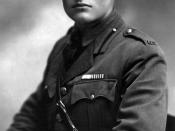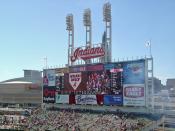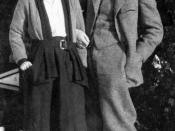Literary Analysis of "Indian Camp"
A careful examination of the short story "Indian Camp" by Ernest Hemingway reveals the usage of such literary devices as plot and theme to deliver both the unfolding story and the meaning behind it. The theme of the story is a powerful message about the realities of life and the plot is the canvas upon which the theme is painted. Clearly, both the plot and the theme are of equal importance in Indian Camp and are the most significant literary tools used throughout the story. Hemingway intended for the plot to be simple and not to be over analyzed. It is how the theme emerges and how the plot helps to reveal the story's true meaning that must be analyzed.
A doctor brings his son Nick and 'Uncle George' to a house call upon an Indian reservation. They must travel by river in small boats, then through a thick forest for some time.
Once they arrive at the house, Nicks father must operate on a pregnant Indian, whose been in labor for two days and is clearly experiencing birth complications. The pregnant Indian is in a great deal of pain and her husband offers no words of comfort as he feels a sense of self pity knowing that he can't help his wife. Eventually Nick's father delivers the baby and stitches up the exhausted mother, then he turns to the husband of the Indian women only to find that he had committed suicide while lying in bed. Assuming he could not bear to see his wife endure so much suffering. On their way back to the boat, Nick asks his father a few questions about death and is comforted by the still flabbergasted doctor.
The plot is rather easy to follow and allows the reader to visualize the theme without losing touch of the story's fundamental structure. The theme of Indian Camp is rich with meaning and delivers the powerful message that the cycle of life never ceases. In the beginning Uncle George, Nick and his Father embark upon a journey so that the doctor [Nick's father] can deliver a baby. The journey they take to reach the lady is long and seemingly endless. They must travel across the river and through the forest overcoming any obstacles and blinded by nightfall. This journey seems much like the journey one takes after birth, commonly referred to as the journey of life. Once they arrive at the Indian's house Nick's father delivers the baby and then finds the father of the baby dead. It could not be any more of an ironic event. Through this happy yet tragic chain of events, the true message of our own mortality is exposed. Life gives way to death and the converse is also true, however Nick has the typical immortal outlook of youth. The author states: "Nick felt quite sure that he would never die." Clearly Hemingway is attempting to remind us of our own mortality.
The plot is a way of transmitting theme to the reader and therefore both are essential literary devices in the story. Without the use of such literary terms as plot and theme, there would be no literature. Ernest Hemingway uses both plot and theme in Indian Camp to remind us of the preciousness of life and its inevitable end. Perhaps, we need to stop taking for granted what we may not have tomorrow.





